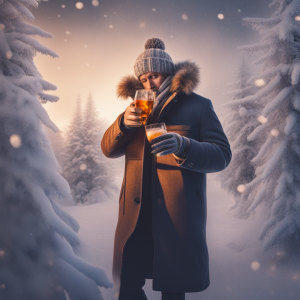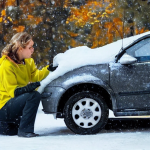Understand the Serious Dangers of Alcohol Consumption in Frigid Weather
As we confront the brutal challenges of winter, especially in severe cold climates, it's common for individuals to seek warmth and comfort through alcohol. However, it is critical to recognize the significant risks that accompany this choice. This article will illuminate the perils associated with consuming alcohol in freezing environments, highlighting why this practice is not only dangerous but also ineffective in keeping the body warm. By enhancing your awareness of these risks, you can make informed choices that prioritize your safety and well-being amid the treacherous conditions that winter presents.
Before we explore the associated dangers, it's vital to dispel the myth that alcohol can act as a warming agent. When consumed, alcohol causes the dilation of blood vessels near the skin's surface, creating an initial but misleading sensation of warmth. While this feeling may seem comforting, it fails to address the essential need for maintaining a stable internal body temperature. In reality, the effects of alcohol can be detrimental, significantly impairing your ability to withstand cold weather and heightening the risks of encountering severe conditions such as hypothermia and various other serious health complications.
 One of the most alarming risks associated with alcohol consumption in cold climates is the heightened chance of dehydration. Alcohol acts as a well-known diuretic, which encourages increased urine output, resulting in significant fluid loss. Additionally, the frigid air typical of winter conditions is often drier, and our bodies tend to lose moisture more quickly in these environments. The combination of these factors can lead to dangerously low hydration levels, which are crucial for sustaining overall health and survival. Dehydration not only affects physical performance but also impairs cognitive functions, making it difficult to think clearly and make rational decisions during critical moments.
One of the most alarming risks associated with alcohol consumption in cold climates is the heightened chance of dehydration. Alcohol acts as a well-known diuretic, which encourages increased urine output, resulting in significant fluid loss. Additionally, the frigid air typical of winter conditions is often drier, and our bodies tend to lose moisture more quickly in these environments. The combination of these factors can lead to dangerously low hydration levels, which are crucial for sustaining overall health and survival. Dehydration not only affects physical performance but also impairs cognitive functions, making it difficult to think clearly and make rational decisions during critical moments.
Recognize How Alcohol Consumption Affects Decision-Making and Awareness in Cold Weather
Another vital consequence of consuming alcohol is its ability to hinder cognitive function and decision-making skills. In survival scenarios, making clear and rational choices is crucial for ensuring personal safety. Alcohol can cloud judgment, making it increasingly challenging to react appropriately to potential hazards. This impairment in reasoning can result in accidents and poor decisions, which can be particularly disastrous in extremely cold conditions. Maintaining alertness and awareness of your surroundings is essential; however, alcohol undermines this necessity, leading to a greater likelihood of errors that could jeopardize your safety.
Furthermore, alcohol has a significant impact on the body's natural ability to regulate its temperature. Upon ingestion, alcohol causes blood vessels in the skin to expand, resulting in increased heat loss. Initially, this may create a temporary feeling of warmth, but as time passes, it accelerates the loss of core body heat, which is essential for survival. This creates a perilous cycle where transient warmth leads to a rapid decrease in core temperature, significantly raising the risk of life-threatening conditions such as hypothermia. It is crucial to understand that while alcohol may seem to provide a quick solution to cold, it actually heightens vulnerability.
Understanding the Link Between Alcohol Use and Hypothermia Risk
When discussing the risk of hypothermia, it's important to grasp how alcohol consumption can obscure the early warning signs of this serious condition. Hypothermia sets in when the body's core temperature drops below the normal threshold, typically below 95 degrees Fahrenheit (35 degrees Celsius). Symptoms may include shivering, confusion, fatigue, and decreased coordination. However, alcohol suppresses our body's natural responses, making it harder to identify these critical indicators. By the time symptoms of hypothermia become apparent, it may already be too late to avert severe injury or life-threatening consequences.
In winter survival situations, there are numerous safer and more effective alternatives to alcohol for preserving body warmth. Here are some strategies that can significantly enhance your ability to stay warm and safe:
1. Dress in Layers for Optimal Warmth: Wearing multiple layers of clothing is essential for effectively trapping warm air. Begin with thermal base layers, add insulating mid-layers, and finish with a windproof and waterproof outer layer to create a barrier against the cold.
2. Keep Your Clothing and Footwear Dry: Moisture leads to rapid heat loss, making it vital to ensure that your clothing and footwear remain dry at all times. Opting for waterproof materials and changing into dry garments whenever necessary can significantly help in maintaining warmth.
3. Insulate Yourself from the Cold Ground: Utilizing sleeping mats or insulation pads can greatly reduce heat loss, especially during sleep. Taking this measure is critical for conserving body heat during extended periods in cold environments.
4. Choose Warm, Non-Alcoholic Beverages: Rather than resorting to alcohol, consider enjoying hot beverages like tea, coffee, or hot chocolate. These drinks provide warmth without the adverse effects associated with alcohol consumption.
5. Find or Build Shelter for Protection: Actively seeking out or constructing a shelter can significantly minimize exposure to harsh winds and freezing temperatures. A well-constructed shelter is vital for retaining body heat, substantially improving your chances of staying warm.
6. Fuel Your Body with High-Calorie Foods: Consuming nutrient-rich foods that are high in calories can equip your body with the necessary energy to generate heat. Foods like nuts and fatty fish are excellent sources of healthy fats that can be particularly beneficial in cold weather.
Recognizing the risks associated with alcohol consumption in freezing temperatures is crucial for anyone involved in winter survival situations. Despite the temporary sensation of warmth, alcohol can lead to dehydration, impaired decision-making, hindered temperature regulation, and can mask the symptoms of hypothermia. By avoiding alcohol and implementing safe, effective strategies, we can enhance our chances of surviving and thriving in harsh winter environments. Stay alert, prepare diligently, and prioritize your safety above all else.
The post Hazards of Alcohol Consumption in Extreme Cold Conditions appeared first on Survival Bite.
The Article Alcohol Consumption Hazards in Extreme Cold Conditions Was Found On https://limitsofstrategy.com

